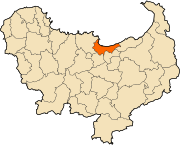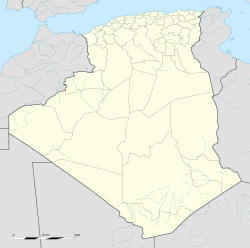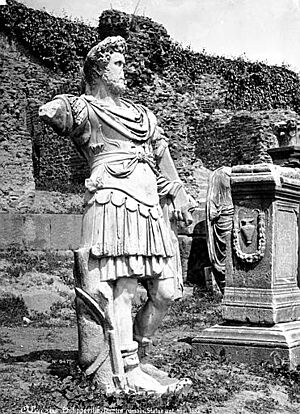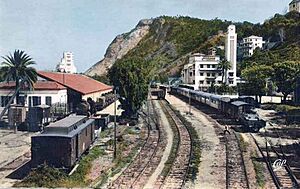Skikda facts for kids
Quick facts for kids
Skikda
سكيكدة
|
|
|---|---|

Location of Skikda in the Skikda Province
|
|
| Country | |
| Province | Skikda |
| District | Skikda District |
| Founded | 1200 BC |
| Area | |
| • Total | 52 km2 (20 sq mi) |
| Elevation | 18 m (59 ft) |
| Population
(2008 census)
|
|
| • Total | 182,903 |
| • Density | 3,520/km2 (9,110/sq mi) |
| Time zone | UTC+1 (CET) |
| Postal code |
21000
|
| Climate | Csa |
Skikda (Arabic: سكيكدة) is a city located in northeastern Algeria. It is an important port city on the Mediterranean Sea. In the past, it was known as Philippeville (from 1838 to 1962) and Rusicade in ancient times. Skikda is the main city of the Skikda Province and Skikda District.
Contents
History of Skikda
Long ago, the Phoenicians and Carthaginians set up a trading post and a fort here. They called it RŠKD, which meant "Jug Cape" because of a nearby cape. When the Romans took control after the Punic Wars, they changed the name to Rusicade. This Roman city had the biggest Roman theatre in Algeria, built during the time of Emperor Hadrian.
Later, around 530 AD, the port was destroyed when the Vandals invaded. The Byzantines took back the area a few years later, but much of it was still controlled by local Berber groups. By the end of the 7th century, the Umayyad Caliphate took over the town.
The modern city of Skikda was started by French governor Sylvain Charles Valée in 1838. He named it Philippeville to honor the French king at that time, Louis Philippe I. The French were taking control of Algeria and built Philippeville as a key port for Constantine, which was Algeria's third-largest city. The two cities were later connected by a railway line. In 1878, a big storm destroyed the harbor and all the ships in it. A larger, stronger harbor was then built. An earthquake also hit Philippeville on October 10, 1883.
Towards the end of World War II, a refugee camp called Camp Jeanne d'Arc was set up near the city. In 1945, some Jewish people who were prisoners in the Bergen-Belsen concentration camp were sent to this camp in Skikda as part of a prisoner exchange.
Conflict in Philippeville (1955)
During Algeria's War of Independence, a conflict happened in 1955. This event led to many deaths, including French people and those believed to be working with them. In response, French forces increased their actions against the FLN (National Liberation Front). This period saw a significant number of civilian casualties.
Shipping Accident (1989)
Skikda has a busy commercial harbor with a special terminal for gas and oil. On February 15, 1989, a Dutch tanker ship, the MV Maassluis, was waiting outside the port. A very bad storm hit, and the ship's anchors could not hold it. The ship crashed into the port's pier, and 27 of the 29 people on board died in this tragic accident.
Modern Skikda
Today, Skikda has about 250,000 people. In the 1970s, industries for natural gas, oil refining, and petrochemical products were developed here. Pipelines were built to transport these products. The city hall, which looks like a beautiful palace, and the train station were designed by the famous architect Le Corbusier.
The official colors of Skikda's city flag are blue and white, which represent the Mediterranean Sea. The current postal code for Skikda is 21000. Skikda has the third largest commercial port in Algeria, after Algiers and Oran. It also has a special port for petrochemicals and a smaller fishing port in Stora. There are many lovely beaches along the natural Mediterranean coastline. There is also an airport near the petrochemical complex, but it is not currently in use.
Geography and Climate

Skikda is located on the coast of the Gulf of Stora, which is part of the Mediterranean Sea. The area around the city is hilly and covered with forests, with tall ridges on both the western and eastern sides.
Climate in Skikda
Skikda has a Mediterranean climate (called Csa in the Köppen climate classification system). This means it has cool, wet winters and very warm, dry summers.
| Climate data for Skikda (1961–1990, extremes 1926–1992) | |||||||||||||
|---|---|---|---|---|---|---|---|---|---|---|---|---|---|
| Month | Jan | Feb | Mar | Apr | May | Jun | Jul | Aug | Sep | Oct | Nov | Dec | Year |
| Record high °C (°F) | 26.4 (79.5) |
30.6 (87.1) |
32.0 (89.6) |
34.6 (94.3) |
38.8 (101.8) |
41.0 (105.8) |
44.4 (111.9) |
46.7 (116.1) |
44.0 (111.2) |
38.0 (100.4) |
33.0 (91.4) |
28.0 (82.4) |
46.7 (116.1) |
| Mean daily maximum °C (°F) | 16.1 (61.0) |
16.6 (61.9) |
17.5 (63.5) |
19.5 (67.1) |
22.2 (72.0) |
25.1 (77.2) |
28.4 (83.1) |
28.9 (84.0) |
27.3 (81.1) |
24.3 (75.7) |
20.5 (68.9) |
17.1 (62.8) |
22.0 (71.6) |
| Daily mean °C (°F) | 12.0 (53.6) |
12.3 (54.1) |
13.2 (55.8) |
15.1 (59.2) |
17.9 (64.2) |
21.0 (69.8) |
23.9 (75.0) |
24.6 (76.3) |
22.9 (73.2) |
19.8 (67.6) |
16.1 (61.0) |
13.0 (55.4) |
17.6 (63.7) |
| Mean daily minimum °C (°F) | 8.0 (46.4) |
7.9 (46.2) |
8.8 (47.8) |
10.7 (51.3) |
13.5 (56.3) |
16.7 (62.1) |
19.4 (66.9) |
20.2 (68.4) |
18.5 (65.3) |
15.3 (59.5) |
11.6 (52.9) |
8.9 (48.0) |
13.3 (55.9) |
| Record low °C (°F) | 0.0 (32.0) |
−0.5 (31.1) |
−0.6 (30.9) |
3.0 (37.4) |
5.0 (41.0) |
8.0 (46.4) |
10.2 (50.4) |
12.3 (54.1) |
11.6 (52.9) |
2.0 (35.6) |
0.0 (32.0) |
0.0 (32.0) |
−0.6 (30.9) |
| Average precipitation mm (inches) | 115.3 (4.54) |
94.0 (3.70) |
75.6 (2.98) |
60.8 (2.39) |
29.9 (1.18) |
13.1 (0.52) |
2.9 (0.11) |
9.7 (0.38) |
30.1 (1.19) |
75.0 (2.95) |
99.2 (3.91) |
123.0 (4.84) |
728.8 (28.69) |
| Average precipitation days (≥ 0.1 mm) | 15 | 11 | 12 | 10 | 7 | 5 | 1 | 3 | 7 | 12 | 13 | 16 | 112 |
| Average relative humidity (%) | 75 | 75 | 75 | 75 | 76 | 75 | 73 | 75 | 75 | 74 | 75 | 75 | 75 |
| Mean monthly sunshine hours | 139.5 | 155.4 | 207.7 | 222.0 | 279.0 | 306.0 | 356.5 | 322.4 | 258.0 | 201.5 | 156.0 | 133.3 | 2,737.3 |
| Mean daily sunshine hours | 4.5 | 5.5 | 6.7 | 7.4 | 9.0 | 10.2 | 11.5 | 10.4 | 8.6 | 6.5 | 5.2 | 4.3 | 7.5 |
| Source 1: NOAA | |||||||||||||
| Source 2: Deutscher Wetterdienst (extremes 1926–1992, sun 1952–1990, humidity 1973–1992, and avg. precipitation days 1952–1970) | |||||||||||||
Economy
Skikda has always been known for its seaport. In 1911, it was described as having "the youngest Algerian seaport."
On January 19, 2004, there was a fire and explosion at the Skikda LNG (Liquefied Natural Gas) facility. This accident resulted in 29 deaths and caused a lot of damage. It affected a significant part of the world's ability to process natural gas. The explosion happened after a large leak of cold hydrocarbon entered a boiler, causing it to explode. This event is considered one of the biggest industrial disasters in the hydrocarbon industry.
Transportation
The main road from Skikda is the N3, which connects to El Arrouch, Constantine, Batna, Biskra, and Touggourt. Smaller local roads lead to nearby towns like Stora (northwest along the coast), Beni Bechir (south), Bissy and Azzaba (southeast), and El Mersa and Chetaibi (east).
Skikda is the end point of the Algiers-Skikda line, which is one of the main railway lines operated by SNTF (Algeria's national railway company). Most passenger and cargo trains branch off before reaching Skikda. The city also has Skikda Airport, but it is not currently used for flights.
Notable People
- Fadéla M'rabet (born 1935), a writer and a supporter of women's rights.
- Rose Celli (1895–1982), a novelist, playwright, translator, and poet.
Images for kids
See also
 In Spanish: Skikda para niños
In Spanish: Skikda para niños
 | Janet Taylor Pickett |
 | Synthia Saint James |
 | Howardena Pindell |
 | Faith Ringgold |





